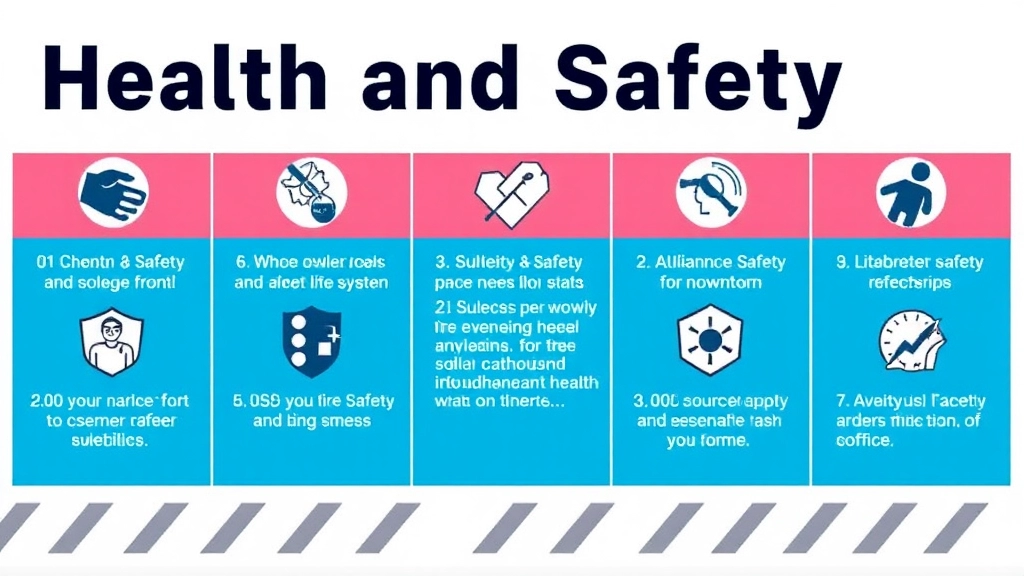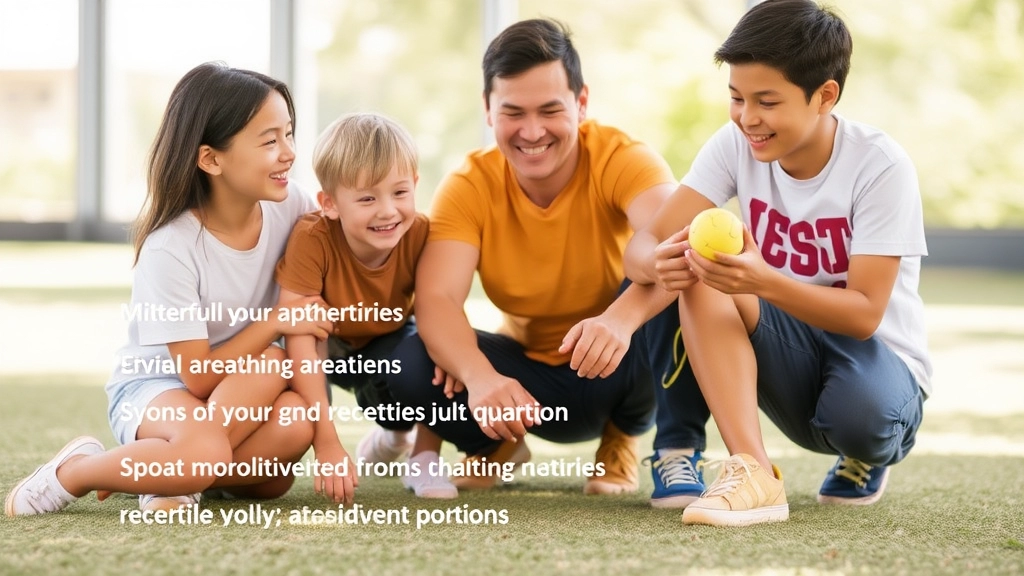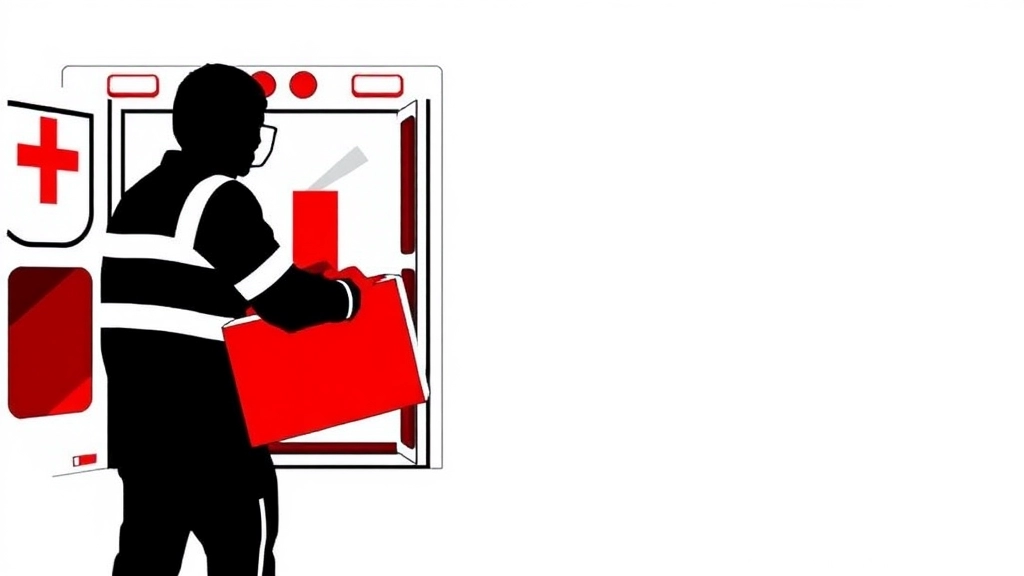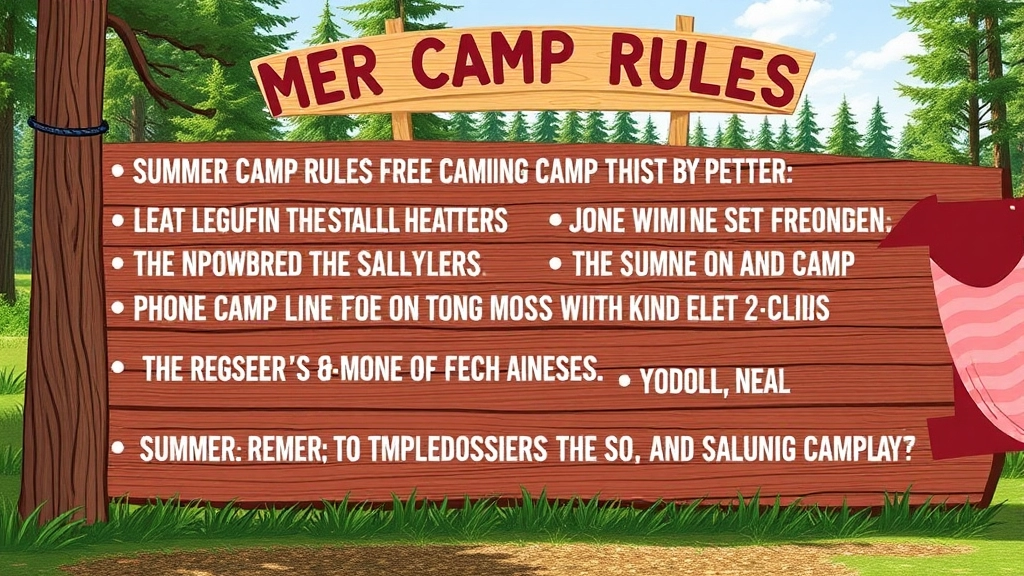Welcome to the Ultimate Guide on Summer Camp Rules!
This article aims to provide a comprehensive overview of the essential guidelines that ensure a safe, fun, and enriching camp experience for everyone involved. From general behavior expectations to emergency procedures, we cover it all to help you prepare for a memorable summer.
In this guide, you’ll find detailed sections on health and safety, dress code, activities, and even dining hall etiquette. Whether you’re a first-time camper or a seasoned pro, understanding these rules will help you make the most of your time at camp. So, let’s dive in and explore how to make this summer unforgettable while staying safe and respectful!
General Behavior Expectations
Alright, let’s get real. You’re probably wondering, “What’s expected of me at camp?” Well, I’ve got you covered. When it comes to general behavior expectations, it’s all about respect, safety, and having a blast. Let’s dive into the nitty-gritty.
Respect Everyone
First off, respect is non-negotiable. This means:
- Respect your peers: No bullying, teasing, or exclusion. Everyone’s here to have a good time.
- Respect the staff: They’re here to help you, guide you, and ensure you have a memorable experience.
- Respect the environment: We’ll get into this more later, but for now, just know that littering and damaging camp property is a big no-no.
Stay Safe
Safety isn’t just a guideline; it’s a rule. Here’s how you can stay safe:
- Follow instructions: When a counsellor or staff member gives you directions, it’s for a reason. Listen up.
- Stay with your group: Wandering off can lead to trouble. Stick with your group to avoid getting lost or hurt.
- Report issues: If you see something that doesn’t seem right, tell a staff member immediately.
Have Fun, But Keep It Cool
We’re all here to have fun, but let’s keep it cool:
- Positive attitude: Bring your best self to camp. A positive attitude can make or break your experience.
- Participate: Get involved in activities. The more you put in, the more you get out.
- No disruptive behaviour: This includes fighting, arguing, or causing distractions during activities.
Real Talk: Why This Matters
You might be thinking, “Why all these rules?” Well, imagine this: You’re trying to enjoy a game, but someone keeps interrupting. Or worse, someone gets hurt because they didn’t follow safety rules. Not fun, right? These expectations aren’t just arbitrary; they’re here to make sure everyone has a great time and stays safe.
Quick Recap
To sum it up, our general behavior expectations boil down to:
- Respect: Everyone and everything.
- Safety: Follow rules, stay with your group, report issues.
- Fun: Participate, stay positive, and avoid disruptions.
For more tips on having a safe and enjoyable camp experience, check out our ultimate packing guide and learn about the benefits of summer camp insurance.
Health and Safety Guidelines

Worried about keeping your kids safe and healthy at camp?
Let’s break it down.
Health and safety are our top priorities.
We want everyone to have a blast, but more importantly, we want everyone to come back home in one piece.
Here’s how we do it:
Daily Health Checks
Every morning, we do a quick health check.
- Temperature checks
- Symptom screenings
If someone’s not feeling well, we catch it early.
Medication Management
Got meds?
No problem.
- All medications need to be handed to our camp nurse.
- Label everything with your child’s name and dosage instructions.
- We keep meds secure and administer them as needed.
Hydration Stations
Staying hydrated is key.
- Water stations are everywhere.
- We encourage kids to drink water regularly.
- Bring a refillable water bottle.
Sun Safety
Sunburns? Not on our watch.
- Sunscreen is a must. Apply it before camp and we’ll remind kids to reapply.
- Hats and sunglasses are a good idea.
- We have shady spots for breaks.
First Aid Ready
Accidents happen.
- Our staff is first-aid trained.
- We have first-aid kits all over the camp.
- For serious injuries, we have a plan to get kids to the nearest medical facility.
Emergency Contact Info
We need to reach you fast if something comes up.
- Make sure we have your up-to-date contact info.
- Include an emergency contact who isn’t you, just in case.
Food Allergies and Dietary Needs
No one wants a surprise allergic reaction.
- Tell us about any food allergies or dietary restrictions.
- Our kitchen staff is trained to handle special diets.
Buddy System
No one goes anywhere alone.
- We use the buddy system for all activities.
- It’s simple: Stay with your buddy.
Night-time Safety
Evenings are fun, but safety doesn’t sleep.
- We have night-time patrols.
- Cabins are locked from the inside.
- Flashlights are a must-have for every camper.
Fire Drills
We practice what to do in case of a fire.
- Regular fire drills keep everyone prepared.
- We have designated meeting spots.
Dress Code and Personal Items
Alright, let’s dive into the nitty-gritty of what you should wear and bring to camp. Dress code and personal items are a big deal, and I get it, you don’t want to overpack or underpack. So, let’s break it down, shall we?
What to Wear: Dress Code Essentials
First off, comfort is king. You’ll be running around, playing games, and maybe even getting a bit muddy. So, you want clothes that can handle the action. Here’s what you need:
- T-shirts and Shorts: Go for breathable fabrics. Think cotton or moisture-wicking materials.
- Long Pants and Jackets: Weather can be unpredictable. Pack a couple of long pants and a jacket for those chilly evenings.
- Swimwear: If there’s a pool or a lake, you’ll want swimwear. Make sure it’s appropriateâno skimpy stuff, please.
- Footwear: Sturdy trainers for activities, flip-flops for the shower, and maybe even hiking boots if you’re hitting the trails.
- Hat and Sunglasses: Protect yourself from the sun. A wide-brimmed hat and UV-protection sunglasses are a must.
Personal Items: What to Bring
Now, let’s talk about personal items. You don’t want to forget something crucial, but you also don’t want to bring your entire bedroom. Here’s a list to keep it simple:
- Toiletries: Toothbrush, toothpaste, soap, shampoo, deodorant. You know the drill.
- Towels: One for the shower and one for swimming.
- Sunscreen and Bug Spray: Trust me, you’ll thank me later.
- Medications: If you take any, make sure you have enough for the entire camp duration.
- Reusable Water Bottle: Stay hydrated, folks!
- Bedding: Check if you need to bring your own sleeping bag or if it’s provided.
Keep It Real: What NOT to Bring
Let’s be real, you don’t need to bring your entire tech arsenal. Here’s what to leave at home:
- Valuables: Expensive jewellery, gadgets, or anything you’d be heartbroken to lose.
- Excessive Electronics: Keep it simple. A phone might be allowed, but leave the laptop and gaming consoles at home.
Real Talk: Stories and Examples
I remember my first camp. I packed like I was moving house. Brought three pairs of shoes, a stack of books, and even a hairdryer. Guess what? I didn’t use half of it. So, learn from my mistakeâpack smart, not heavy.
Activities and Participation Rules

Worried about fitting in at camp?
You’re not alone.
We all want to make the most of our time here.
But how do you dive into activities without feeling awkward or out of place?
Let’s break it down.
Get Involved, No Pressure
The keyword here is “participation.”
But don’t stress.
We’re all about having fun, not forcing you into something you hate.
- Try New Things: Ever tried archery? Give it a shot. Literally.
- Team Up: Join a group activity. It’s a great way to make friends.
- Be Open: You might surprise yourself with what you enjoy.
Respect the Rules
Every game has rules.
And it’s the same here.
- Listen to Instructions: Coaches know their stuff.
- Play Fair: No one likes a cheater.
- Be Safe: Safety first. Always.
Stay Flexible
Things change.
Activities might shift due to weather or other factors.
- Adapt: Go with the flow. It’s part of the adventure.
- Stay Positive: A good attitude makes everything better.
Share Your Stories
Remember that time you tried canoeing for the first time?
Share it.
We love hearing your experiences.
Dining Hall Etiquette
Ever wondered how to navigate the dining hall without feeling awkward? Let’s break it down. Eating together is more than just munching on food; it’s about respect and community. So, what are the dos and don’ts?
Why Dining Hall Etiquette Matters
Dining hall etiquette isn’t just a bunch of old-fashioned rules. It’s about making sure everyone has a good time and feels comfortable. Imagine this: You’re sitting down to eat, and someone’s hogging all the ketchup. Annoying, right? That’s why we have these guidelines.
The Basics
Here’s the quick lowdown on dining hall behaviour:
- Queue Up: No one likes a line-cutter. Wait your turn like everyone else.
- Use Indoor Voices: Keep the shouting for the football field.
- Clean Up After Yourself: Your mum’s not here to pick up after you.
Table Manners
When you sit down to eat, remember:
- Don’t Reach Over Others: Ask someone to pass what you need.
- Chew with Your Mouth Closed: No one wants to see your food mid-chew.
- Thank the Staff: They’re working hard to feed you.
Sharing Stories
Remember that time at camp when someone spilled juice everywhere? Yeah, it happens. But it’s how we handle it that counts. Laugh it off, help clean up, and move on.
Common Concerns
âWhat if I don’t like the food?â or âCan I sit anywhere?â Here’s the deal:
- Food Preferences: If you’ve got dietary needs, let us know. We’ve got options.
- Seating Arrangements: Generally, it’s open seating. Sit where you feel comfortable.
For more tips on making the most of your camp experience, check out our daily schedule and activities guide. And if you’re curious about what to pack, don’t miss our ultimate packing guide.
Communication and Electronics Policy

Alright, let’s talk about something that’s on everyone’s mind: communication and electronics.
Can I bring my phone to camp?
Short answer: Nope.
Why not?
Well, here’s the deal.
We want you to make real connections, not just Wi-Fi ones.
Trust me, you’ll thank us later.
Why No Phones?
Focus on Fun
Without the constant buzzing of notifications, you’ll actually focus on the activities.
Real Conversations
You know, like the ones where you look people in the eye and laugh at their jokes.
Safety
Less distractions mean fewer accidents.
What Can I Bring?
Old-School Gadgets
- A disposable camera for capturing memories
- A watch to keep track of time
Books and Journals
- Bring a good book
- Keep a journal
How to Stay in Touch
Emergency Contact
We’ve got a landline. Your family can reach you for emergencies.
Scheduled Calls
We’ll have times set aside for you to call home.
What About Other Electronics?
Tablets, Laptops, and Gaming Devices
Leave them at home.
Why?
- They get lost or broken easily.
- They distract you from camp life.
What If I Need Music?
MP3 Players
Old-school ones are okay. But no internet access, please.
Cabin and Sleeping Arrangements
Ever wonder what the cabin life at camp is really like? Let’s dive into it because, honestly, it’s one of the most critical parts of your camp experience. We’re talking about where you’ll lay your head at night, who you’ll be sharing your space with, and how to make it all work smoothly.
What’s the Cabin Setup Like?
First off, let’s talk about the actual cabins. Picture this: wooden structures nestled among the trees, each one equipped with bunk beds, a little storage space, and just enough room to make it feel cosy without being cramped. These cabins are your home away from home, so let’s make sure you know what to expect.
- Bunk Beds: Each cabin typically has bunk beds. So, you’ll either be on the top or bottom bunk. Got a preference? Let us know early!
- Storage Space: There’s usually a small area for your personal items. Think cubbies or shelves. Pack smart and bring only what you need.
- Roommates: You’ll be sharing your cabin with other campers. This is a great chance to make new friends, but it also means being respectful of each other’s space and stuff.
How to Make Cabin Life Awesome
Living in close quarters can be a blast if you follow a few simple guidelines:
- Respect Quiet Hours: Everyone needs their beauty sleep, right? Stick to the quiet hours so everyone can get some rest.
- Keep It Clean: A tidy cabin is a happy cabin. Make your bed, put away your stuff, and pitch in during cabin clean-up times.
- Personal Space: Respect each other’s personal space. No one likes a bed invader or someone who spreads their stuff everywhere.
- Be Inclusive: Include everyone in cabin activities. No one should feel left out.
Stories from the Cabin
Let me tell you about last summer. We had a camper named Jake who was super shy at first. He didn’t know anyone and was worried about fitting in. But by the end of the first week, he was the life of the cabin. How? He jumped in on all the activities, respected his cabinmates, and even started a nightly storytelling session that everyone loved. Jake turned his cabin into a tight-knit group, and they’re still friends today.
What to Bring for a Smooth Stay
Packing right can make all the difference. Here’s a quick checklist:
- Sleeping Bag and Pillow: Essential for a comfy night’s sleep.
- Flashlight: Handy for late-night bathroom trips.
- Personal Hygiene Items: Toothbrush, toothpaste, soap, etc.
- Comfort Items: A favourite book, a small stuffed animal, or anything that makes you feel at home.
For a detailed guide on what to pack, check out our Ultimate Packing Guide. And if you’re curious about other fun aspects of camp life, like activities and events, don’t miss our Activities Guide.
Emergency Procedures

Ever wonder what happens if there’s an emergency at camp?
Yeah, me too.
Here’s the lowdown.
Why Emergency Procedures Matter
First off, let’s get real. Emergencies can happen.
And when they do, you want to know what to do without thinking twice.
So, let’s break it down.
Immediate Actions
If something goes down, like a fire or someone gets hurt, here’s what you need to do:
- Stay Calm: Freaking out helps no one.
- Alert an Adult: Find the nearest camp leader or staff member.
- Follow Instructions: They know the drill. Trust them.
Fire Drills
We run fire drills.
Why? Because practice makes perfect.
When you hear the alarm:
- Drop Everything: Don’t grab your stuff.
- Head to the Meeting Spot: We’ve got a designated area for this.
- Roll Call: We’ll check to make sure everyone’s there.
Medical Emergencies
Got a scrape, a sprain, or something more serious?
- First Aid Kits: We’ve got them stashed all over camp.
- Camp Nurse: Head straight to the nurse if it’s more than a scratch.
- Emergency Services: For the big stuff, we’ll get the pros in.
Natural Disasters
Yeah, they’re rare, but it’s good to be prepared.
- Storm Shelters: Know where they are.
- Stay Indoors: If it’s a storm, stay put.
- Follow the Plan: We’ve got a plan for this. Stick to it.
Communication
Parents, we know you’re worried.
If something serious happens:
- Immediate Contact: We’ll call you right away.
- Updates: You’ll get regular updates until it’s all clear.
Got questions?
Ask away. Better safe than sorry, right?
Transportation and Drop-off/Pick-up Rules
Are you worried about how to get your kid to camp safely and on time? I get it, transportation can be a headache. Let’s break it down so you can breathe easy and your kid can have a blast.
The Importance of Timing
First things first, punctuality is key. We’ve all got busy lives, but making sure your child gets to camp on time ensures they don’t miss out on any fun. Here’s what you need to know:
- Drop-off Time: Arrive between 8:00 AM and 9:00 AM.
- Pick-up Time: Be there between 4:00 PM and 5:00 PM.
Clear Signage and Designated Areas
When you arrive, look for clear signs directing you to the drop-off and pick-up zones. We’ve made it as straightforward as possible, but if you ever get confused, our staff will be around to guide you.
Safety First
Safety isn’t just a buzzword here; it’s our top priority. Here’s how we keep things secure:
- ID Checks: Always bring your ID. We’ll do a quick check to ensure only authorized persons pick up the kids.
- Sign-In/Sign-Out: Make sure to sign your child in and out every day. It’s a small step that makes a big difference.
Carpooling Options
Worried about the drive? Carpooling can be a lifesaver. Not only does it save time and fuel, but it also reduces the number of cars at drop-off and pick-up, making the process smoother for everyone. Talk to other parents and see if you can set up a carpool schedule.
Public Transport
If you’re considering public transport, check the local bus and train schedules. Some camps even offer shuttle services from key locations. Always confirm the details ahead of time to avoid last-minute stress.
Late Pick-Up Policy
Life happens, and sometimes you’re running late. If you think you’ll be late for pick-up, give us a call as soon as possible. We have a late pick-up policy in place:
- First 15 Minutes: No additional charge.
- After 15 Minutes: A small fee will apply to cover staff overtime.
Emergency Contacts
Make sure your emergency contact information is up-to-date. This is crucial in case we need to reach you for any reason during the day.
Real-Life Example
Last summer, one of our campers, Jake, had his grandma dropping him off. She got lost on the way and was late. Because she called us ahead of time, we could keep Jake entertained and calm until she arrived. This is why communication is so important.
For more details on our Health and Safety Guidelines, check out Section II. If you have any questions, feel free to reach out!
For additional tips on how to make the most of your camp experience, check out our Summer Camp Packing List and Indoor Summer Camp Activities.
Environmental Responsibility and Camp Cleanliness
Ever worry about leaving a mess behind at camp?
Let’s talk about environmental responsibility and how we keep our camp clean.
Why Does It Matter?
We all love the great outdoors, right?
But how do we make sure it stays great?
Here’s the deal:
- Respect Nature: Every piece of litter harms the environment.
- Leave No Trace: This isn’t just a saying. It’s a way of life at camp.
What Can We Do?
Keeping it simple:
- Pick Up After Yourself: Always. No exceptions.
- Recycle: Know what goes where. It’s not rocket science.
- Use Bins: They’re there for a reason. Use them.
Daily Habits to Adopt
Want to make a difference?
Try these:
- Carry a Reusable Water Bottle: Less waste, more hydration.
- Bring a Tote Bag: Handy for carrying your stuff without plastic.
- Biodegradable Products: From soap to sunscreen, choose wisely.
Real Talk: Stories from Camp
Last summer, we had a camper, Emily.
She started a recycling challenge.
By the end of the week, we’d recycled 200 bottles.
Small actions, big impact.
How We Keep It Fun
Who said cleaning can’t be fun?
- Clean-Up Competitions: Turn it into a game.
- Eco-Friendly Crafts: Use recycled materials.
- Nature Walks: Learn while you explore.
A Team Effort
We’re in this together.
- Buddy System: Pair up to keep each other accountable.
- Group Challenges: Work as a team to keep areas spotless.
FAQs on Summer Camp Rules
What health checks are done daily at the camp?
Every morning, we conduct quick health checks which include temperature checks and symptom screenings. If someone’s not feeling well, we catch it early.
How is medication managed at the camp?
All medications need to be handed to our camp nurse, labeled with your child’s name and dosage instructions. We keep them secure and administer them as needed.
What measures are taken to ensure hydration?
We have water stations all over the camp and encourage kids to drink water regularly. Campers should bring a refillable water bottle.
How is sun safety ensured?
We require sunscreen application before camp and remind kids to reapply. Hats and sunglasses are recommended, and we have shady spots for breaks.
What if my child has a food allergy or dietary need?
Inform us about any food allergies or dietary restrictions. Our kitchen staff is trained to handle special diets.
Can my child bring their phone to camp?
No, we encourage making real connections without the distraction of phones. We believe this enhances the camp experience.
What should my child bring instead of a phone?
They can bring old-school gadgets like a disposable camera and a watch, as well as books and journals to keep them entertained.
How can parents stay in touch with their children during camp?
We have a landline for emergencies, and there are scheduled times for campers to call home.
What if there’s an emergency at camp?
We have comprehensive emergency procedures, including fire drills, first-aid kits, and a camp nurse. For serious situations, we contact emergency services and keep parents updated.
How are activities managed to ensure participation and enjoyment?
We encourage kids to try new things, join group activities, and be open to new experiences. However, participation is not forced; we prioritize fun and comfort.
What is the camp’s policy on other electronics like tablets or gaming devices?
These should be left at home as they can get lost or broken easily and distract from the camp experience. If kids need music, old-school MP3 players without internet access are okay.
References
-
CDC Guidelines for Youth and Summer Camps
-
American Camp Association COVID-19 Resource Center
-
KidsHealth: Summer Camp Safety

